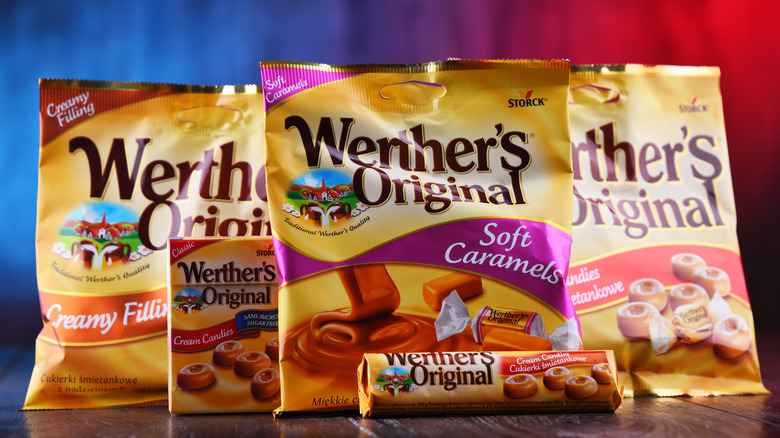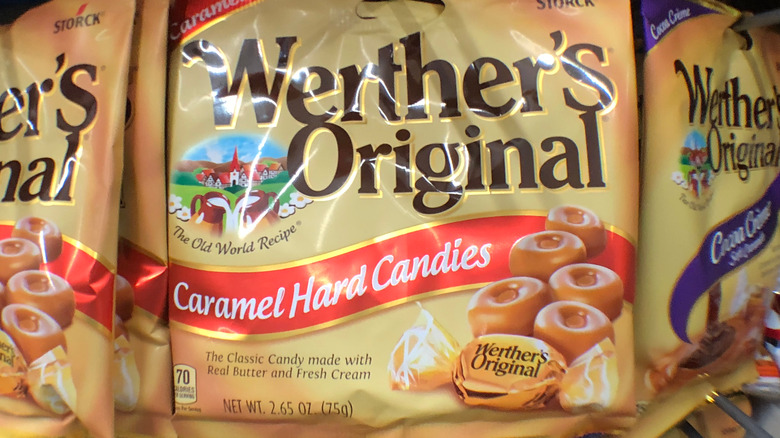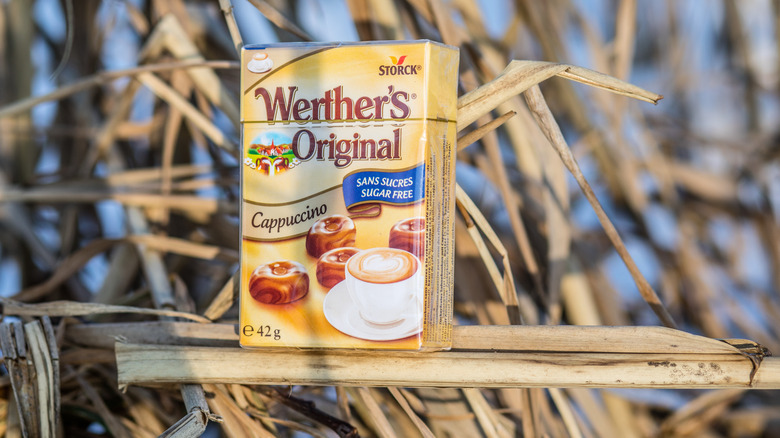Commercials Helped Spark Grandparents' Love For Werther's Original
You're in your grandparents' house as a little kid. You sincerely love your grandma and grandpa as any kid does, sure, but going to their house always feels like you're walking into some kind of museum. There's plastic on all the furniture, the TV is a giant box with long spindly antennas that gets only five or six channels, and in lieu of any "real candy" like Hershey bars or Snickers, there are these dusty glass dishes full of these nameless strawberry-flavored hard candies and pieces of Werther's Originals caramels in trademark gold wrappers.
As Werther's history tells us, these buttery sweet delights of your grandparents were created in 1909 by confectioner Gustav Nebel in the town of Werther, Germany. Although the candy didn't reach the United States until the '70s, with the famous "Werther's Original" coming sometime in the '80s (via Confectionary News), the caramel candy has found its niche in the American candy market. Not only do 3.74 million Americans enjoy Werther's candy products every year (via Statista), there's even a "Karamell-Kuche" shop located in Epcot Center at Disney World, dedicated to showing off Werther's caramel products.
But, aside from selling caramel apples in the House of Mouse or stocking supermarket candy aisles with bags of soft or hard caramel and chocolate chews, Werther's seems to have a particular grip on the oldest generation of Americans. Just what is it about old people and these caramel candies that seem to go together so well?
Werther's had a series of nostalgic commercials
Werther's candies may have gotten their start at the very start of the 20th century, but as far as you know, your grandparents aren't quite that old. How could such a simple candy instill itself so prominently in the lives of our grandmothers and grandfathers?
As Mental Floss explains, it all began with a commercial that aired back in the '80s. In this commercial, an elderly grandfather reminisces about the good times he spent with his own grandfather, sharing Werther's candies. The grandfather then explains that nowadays, he shares Werther's candies with his own grandson. The message was clear: Grandparents can create a strong bond between themselves and their grandchildren just as they shared with their own grandparents.
The commercial, followed by marketing focused on being a "good grandparent," helped encourage seniors across the nation to load up their purses, candy dishes, coat pockets, and anything else with bags of Werther's caramels. Besides, as grandparents give their grandchildren Werther's, that's helping to create a new generation of Werther's customers. You know what they say: You can't deny the power of a good advertising campaign.
Of course, there is a rather obvious downside to centralizing the largest piece of your customer base in the elderly. For good reason, Werther's wants to be more than the candy you find while digging through your grandmother's purse.
Can Werther's market to a younger generation?
Werther's marketing is built around two key concepts: being a caramel that beats the rest and appealing to the consumer's sense of nostalgia and family. How could Werther's market itself as more than the candy your grandpa eats without compromising these two concepts?
The Guardian tells us that Werther's has begun to focus on a younger generation by replacing the classic "grandfather and grandson" duo with a father and son. In one advisement, a father gives his son a Werther's Original just before dropping him off at school. This change was to help to keep the brand "up-to-date," as the company believed that the old grandfather reflected a time that no longer applied to more modern traditions.
Indeed, it's this attempt to shake off being seen as "your grandfather's candy" that has made Werther's seek bold new approaches to promoting its candy. In 2013, Candy Industry tells us, Werther's sought to make their caramels more known for their flavor and their many different uses, noting that as more restaurants use caramel in their products, Werther's must try and capitalize on the increasing demand for the central piece of their signature product. While the focus on nostalgia and comfort will still be there, it will no longer be focused directly on improving the relationships between grandparents and grandchildren.
You're on your own for that one, it seems.


